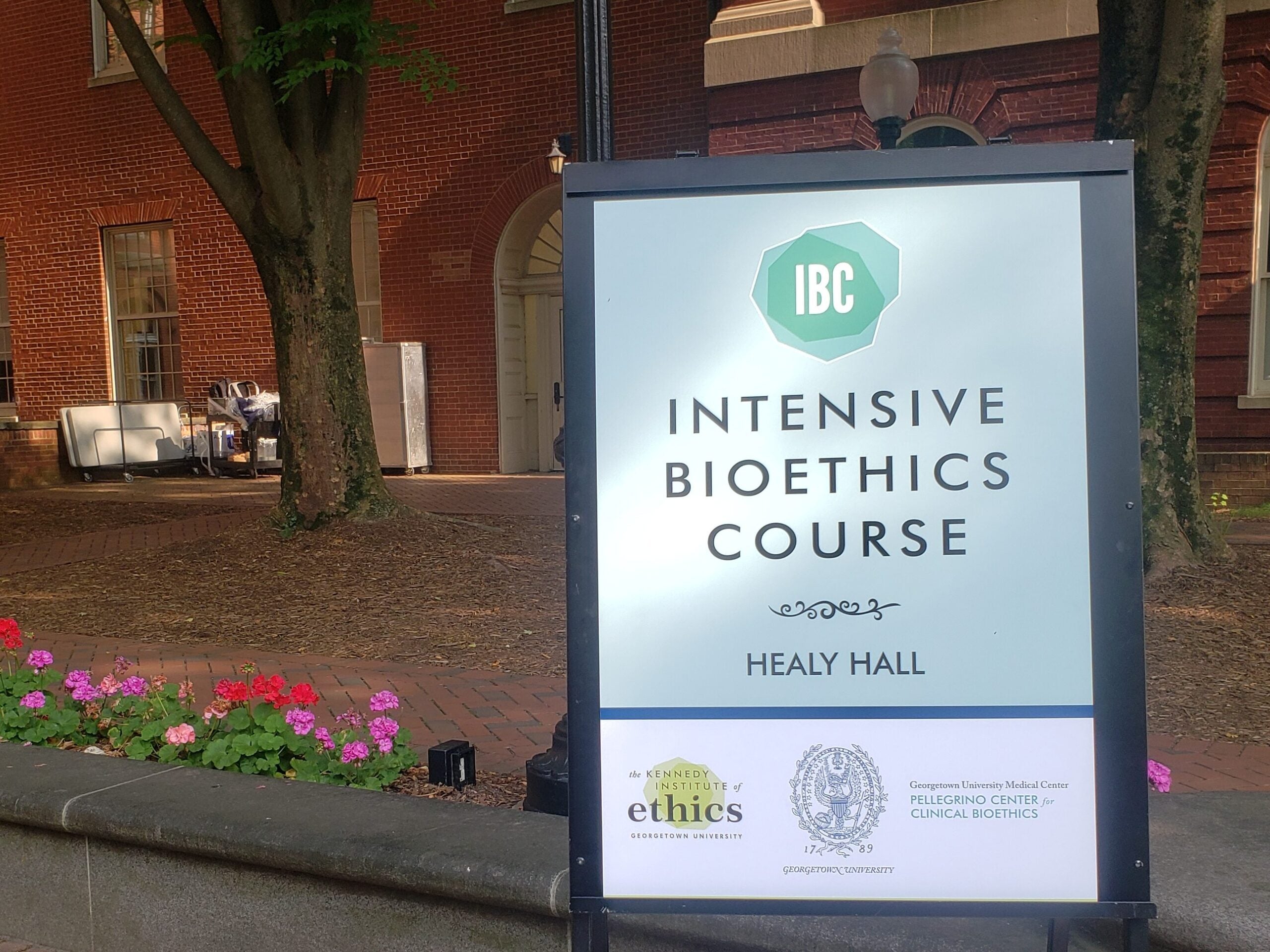About IBC44 (2023)
Thanks to all who made IBC44 another success. Read on to learn about the IBC44 program.
KENNEDY INSTITUTE OF ETHICS IN ASSOCIATION WITH THE PELLEGRINO CENTER FOR CLINICAL BIOETHICS

During IBC44, which took place June 3-5 2023, Day 1 (led by experts from the KIE) explored ethical theory, including core ethical principles and issues in global bioethics. Day 2 (led by experts from the PCCB) focused on key issues and challenges in clinical bioethics. Day 3 addressed selected contemporary and emerging bioethical issues. The course retained its ever-popular small-group discussion sessions that explored the issues raised by the plenary talks.
June 5-7, 2023
Georgetown University Main Campus
Monday 5 June
9:00-9:45 am REGISTRATION
9:45 am: Introduction & Welcome
John Keown, DPhil, PhD, DCL
IBC Course Director
Rose F. Kennedy Professor in Christian Ethics
Senior Research Scholar
Kennedy Institute of Ethics
10:00 am: “The Internal Morality of Medicine: Vital Concept or Quaint Relic?”
Myles N. Sheehan, SJ, MD
Director, Pellegrino Center for Clinical Bioethics
Professor of Medicine
David Lauler Chair in Catholic Health Care Ethics
Georgetown University
Director, Kennedy Institute of Ethics
SESSION OBJECTIVES:
- List the elements of Pellegrino’s concept of the Internal Morality of Medicine.
- Describe contemporary challenges to the concept due to the way medicine is currently practiced.
- Explain objections to the concept.
- Develop your own position on whether the concept is vital or a quaint relic.
11:00 Break
11:30: SMALL GROUPS
12:30: Lunch
2:00 pm: “Disability & the Definition of Health”
Sean Aas, PhD
Assistant Professor of Philosophy
Senior Research Scholar
Kennedy Institute of Ethics
SESSION OBJECTIVES:
- Become aware of the main philosophical theories of health
- Learn how to approach conversation about disability and health with sensitivity to and awareness of the perspectives of disabled patients
2:45 pm: “Complex Patients During Public-Health Crises: People Labelled with Intellectual and Developmental Disabilities”
William F. Sullivan, MD, PhD
Joseph P. Kennedy Sr. Chair in Bioethics
Kennedy Institute of Ethics
SESSION OBJECTIVES:
- Explain how ‘autonomy’ is fundamentally ‘relational’;
- Describe how ‘consent’ to a healthcare intervention involves realizing distinct and complementary decision-making capabilities, a key one being judging moral/affective facts; and
- Apply a supported decision-making approach to cases to promote healthcare decision- making capabilities of people with intellectual and developmental disabilities (PWIDD) by assessing risks, involving caregivers, and advocating for needed accommodations and
supports
3:30 pm: Break
4:00 pm: SMALL GROUPS
5:00 – 6:30 pm: Opening Reception

Tuesday 6 June
9:00 am: “Autonomy”
Daniel P. Sulmasy, MD, PhD
André Hellegers Professor of Biomedical Ethics
Pellegrino Center for Clinical Bioethics
SESSION OBJECTIVES:
- Be able to distinguish between dignity, autonomy, and agency
- Be able to explain how respect for autonomy is important for bioethics because it enhances human moral agency
10:00 am: “Organizational Integrity in Our Changing World”
Carol Taylor, PhD, RN
Professor of Medicine and Nursing
Senior Clinical Scholar, Kennedy Institute of Ethics
SESSION OBJECTIVES:
- Define ethics, moral agency, and moral integrity
- Describe how both individuals and institutions develop moral agency and integrity and the consequences of honoring or dishonoring integrity
- Analyze how an institution’s mission, vision and core values influence institutional decision making, behavior and integrity
- Contrast integrity-based and compliance-based organizational ethics programs
11:00 am Break
11:30 am: SMALL GROUPS
12.30 pm: Lunch
2:00 pm “Ethics Committees & Consultation”
Claudia Ruiz Sotomayor, MD, DBe
Adjunct Assistant Professor of Medicine
Chief, Ethics Consultation Service
Pellegrino Center for Clinical Bioethics
SESSION OBJECTIVES:
- Understand the new challenges and trends of ethics consultation and ethics committees.
- Analyze what resources are available to practice clinical ethics in different communities.
- Formulate practical ways to implement new techniques in the participant’s practice.
2:45 pm: “Medical Interventions and End of Life Decisions”
Allen H. Roberts, II, MD, MDiv, FCCP, FACP
Professor of Clinical Medicine and Associate Medical Director
MedStar Georgetown University Hospital
SESSION OBJECTIVES:
- Understand the dynamics of patient and family interactions in the ICU
- Identify the ethical issues surrounding withholding and withdrawal of life support
- Appreciate the concept of biomedical futility in contemporary medical literature and practice
3:30pm: Break
4:00 pm: SMALL GROUPS
6:00 pm: Bioethics Movie Viewing and Discussion (optional session)
Laura J. Bishop, PhD
Associate Teaching Professor and Academic Program Director
Kennedy Institute of Ethics
Wednesday 7 June
9:00 am: “Data Ethics & Health Informatics”
Margaret Little, PhD
Francis J. McNamara, Jr. Chair of Philosophy
Senior Research Scholar
Director, Ethics Lab
Kennedy Institute of Ethics
SESSION OBJECTIVES:
- Obtain a beginning orientation to the technical nature of Big Data and AI
- Identify some key pros and cons to these new technologies in their application to health care
- Identify some key criteria of responsible development, deployment, and use of these technologies
10:00 am: “Medical Mistrust”
Alyssa Newman, PhD
Assistant Professor of Sociology
Senior Research Scholar
Kennedy Institute of Ethics
SESSION OBJECTIVES:
- Identify the conceptual limitations of the mistrust framework for analyzing and explaining racial health inequities
- Apply alternative frameworks that center the role of institutions to analyze ongoing racial health inequities
- Leverage a Black bioethics perspective and analytical lens in order to reconceive the issue of medical mistrust and the relationship of Black communities to medical institutions
11:00 am Break
11:30 am: SMALL GROUPS
12.30 pm: Lunch
2:00 pm: “Quality of Life”
Joel Michael Reynolds, PhD
Assistant Professor of Philosophy and Disability Studies
Senior Research Scholar
Kennedy Institute of Ethics
SESSION OBJECTIVES:
- Better understand the complex issues impacting quality and equity of care for disabled patients
- Develop a critical, historically-informed understanding of the concept of “quality of life”
- Appreciate the role of ableism in healthcare delivery and how to become actively anti- ableist
2:45 pm: “Neuroethics”
James Giordano, PhD, MPhil
Chief, Neuroethics Studies Program
Pellegrino Center for Clinical Bioethics
SESSION OBJECTIVES:
- Define neuroethics as a discipline and set of practices
- Discuss major neuroethical issues arising in and from research in, and use of current and emerging neuroscientific tools and methods
- Provide examples of how multinational efforts in the brain sciences can influence neuroethical discourse and practices